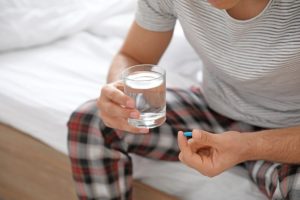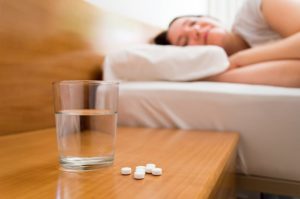Sleeping Pills: Medications & Prescription Sleep Aids
- Sleeping pills are often prescribed for short-term relief from sleep disturbances.
- The effectiveness of sleeping pills can vary, and side effects may arise.
- Individuals should consult with healthcare professionals before using sleeping pills.
- Consider improving sleep hygiene and addressing lifestyle factors affecting sleep.
More than one-third of American adults struggle to get enough sleep, and in response, many turn to sleeping pills. About 8.2% of American adults report using a sleep aid at least four times in the last week.
Sleep aids include prescription medications, over-the-counter drugs, and dietary supplements, many of which are labeled as “natural” sleep aids. Within those categories are multiple types of drugs and compounds that affect the body in distinct ways.
Every sleep aid has potential benefits and risks, so it’s important to be informed about how they work, what conditions they may help with, and how to use them safely. To find the best sleep medication, it’s necessary to work with a doctor who can recommend a specific sleep aid based on your situation.
Categories of Sleep Medications
There are three broad categories of sleep aids: prescription drugs, over-the-counter medications, and dietary supplements.
It is impossible to choose the best sleep medication for all situations. When a sleep aid is needed, the optimal choice depends on a person’s circumstances including the nature of their sleep problems, overall health and coexisting conditions, other medications they are taking, and the cost and availability of different medications.
Given the multitude of factors that can inform this decision, it is best to talk with a doctor before taking any sleep aid, including those that are sold over-the-counter or as a dietary supplement.
The categories are distinct based on the active ingredients they include and how they function. Each category is also subject to different types of regulation and accessibility.
Prescription Drugs
Prescription drugs are only available from pharmacies and must be ordered by a doctor for a specific patient. These medications are closely regulated by the U.S. Food and Drug Administration (FDA), which must approve any prescription drug based on its history of safety and efficacy in clinical trials.
Every drug approved by the FDA has a specific indication, which describes the medical conditions that it is intended to treat. However, once a drug is approved for one indication, doctors may prescribe it for other conditions, which is known as “off-label” use.
Many prescription drugs are approved by the FDA to treat sleep problems while others are used off-label to try to improve sleep. Prescription sleep medications generally work by altering chemicals in the brain that are involved in regulating sleep and wakefulness .
The following may be used for sleep problems:
- Z-drugs: Hypnotics and sedatives are drugs that are designed to make a person feel sleepy . The first generation of prescription hypnotics, called benzodiazepines, worked by increasing the brain’s production of gamma-aminobutyric acid (GABA), a chemical that induces drowsiness. In recent years, a newer class of hypnotics, often called Z-drugs based on their medical names, have become more commonly prescribed. These drugs generally have fewer side effects than traditional benzodiazepines. Other types of sedative drugs, such as barbiturates, may help people feel sleepy, but they are rarely prescribed for sleeping problems due to the risk of addiction and overdose.
- Orexin Receptor Antagonists: Orexin receptor antagonists work by blocking the effect of orexin , a natural substance that increases wakefulness. By decreasing levels of orexin, these drugs promote sleepiness without some of the effects that arise with other hypnotics like headache, nausea, and short-term forgetfulness.
- Melatonin Receptor Agonists: Melatonin is a hormone that is naturally produced by the body that facilitates sleep and a steady circadian rhythm. A melatonin receptor agonist is a prescription drug that mimics the effect of melatonin and is typically used to help people who have problems getting to sleep. This prescription drug is different from an over-the-counter melatonin supplement.
- Antidepressants: Antidepressants are drugs that were initially developed to treat depression. Some of these drugs, including selective serotonin reuptake inhibitors (SSRIs) and tricyclic antidepressants (TCAs), have been found to cause drowsiness for some people. As a result, antidepressants are sometimes prescribed for sleeping issues. However, antidepressants have not been specifically approved by the FDA for sleeping problems .
- Anticonvulsants: Anticonvulsants are drugs that are used primarily to treat seizures, and in some cases, they are prescribed off-label for sleeping problems . Their effect on sleep is tied to their potential anti-anxiety properties , but in-depth research is limited about their benefits for sleep.
- Antipsychotics: Antipsychotics are a class of drugs used with mental health disorders as they work to reduce delusions and hallucinations. They are sometimes prescribed off-label as a treatment for sleeping problems because of their sedative effect that is tied to how they influence the chemical serotonin in the brain.
Over-the-Counter Drugs
Over-the-counter (OTC) drugs can be purchased without a prescription and are frequently sold in pharmacies, drug stores, and many supermarkets. Individual brands of OTC medications do not require direct FDA approval, but the active ingredient in them must be FDA approved and they must meet specific standards set by the FDA .
There are many different brands of over-the-counter sleep medications. Almost all of these are antihistamines, which are commonly used to treat allergies. Antihistamines frequently cause drowsiness, which has led to their use as an OTC sleep aid .
Dietary Supplements
A wide range of sleep aids are sold as dietary supplements. Dietary supplements do not require FDA approval before being sold and are not regulated in the same way as prescription and OTC drugs.
No prescription is required to purchase dietary supplements, and they are sold in pharmacies, drug stores, supermarkets, specialty stores, and online.
Natural sleep aids, including melatonin, kava, valerian, magnesium, and other products, are available as dietary supplements. Many sleep aids combine different ingredients and dosages in a pill, liquid, or chewable form.
For most dietary supplements, there is limited research documenting their benefits and risks. For this reason, these products are generally not recommended by the American Academy of Sleep Medicine for insufficient sleep.

What Conditions Can Be Treated With Sleep Medications?
Sleep medications are frequently prescribed to treat insomnia. Drugs designed to make a person drowsy or stay sleeping throughout the night, such as hypnotic-sedative medications, are typically intended to allow people with symptoms of insomnia to sleep better.
Some sleep supplements, including melatonin, may also be used to treat circadian rhythm sleep disorders, which occur when a person’s internal clock is misaligned with the day-night cycle. People who have jet lag from air travel or shift work disorder from working at night may benefit from melatonin..
Other types of sleep disorders, such as parasomnias or restless leg syndrome, may be treated with other types of drugs that are intended to address the symptoms of those conditions rather than induce sleepiness.
Are Medications the Only Treatment for Sleep Problems?
Many sleeping problems can be addressed without any sleep medications at all. In fact, in many cases, non-medical approaches are preferred as a first treatment, with medications only being used if sleep problems persist. This is especially true for older adults and people with coexisting health conditions who may be more likely to have adverse reactions to sleep medications.
A well-established alternative to sleep medications is cognitive behavioral therapy for insomnia (CBT-I). CBT-I helps uncover and reorient negative thinking about sleep while encouraging better sleep hygiene.
Improvements to sleep hygiene, including the sleep environment and daily habits, are often helpful in improving the quality and consistency of a person’s sleep. Sleep hygiene changes may include setting a standard sleep schedule, reducing alcohol and caffeine intake, and optimizing the bedroom environment to eliminate sleep disruptions. A regular nightly routine to get ready for bed, including steps to help relax and unwind, are often helpful for people who struggle to fall asleep.
Depending on a person’s situation, these non-medical approaches may be used along with sleep medications as a form of combination therapy.
Potential Benefits and Risks of Sleep Medications
The potential benefits of sleep medications are improved sleep duration, better ability to sleep through the night, and a more stable sleep schedule. Improving sleep can reduce daytime sleepiness. Sleep aids may help reset sleep patterns to enable healthier habits.
The possible downsides of sleep aids vary based on the specific medication and the person taking them. Some of the risks of taking sleep aids include:
- Habit formation: A person may become dependent on medication even if it’s not intended for long-term use. Abruptly stopping taking the drug after prolonged use may lead to worsening sleep problems or withdrawal symptoms.
- Decreasing effectiveness: People can build up a tolerance to many medications, including hypnotics , reducing their benefits and potentially worsening side effects if the dosage is increased.
- Excessive grogginess: The sleepiness induced by many sleep aids can affect a person’s thinking and balance. Being too groggy may create a higher risk of falls or other accidents at night, especially for older adults and people with conditions like dementia.
- Next-day drowsiness: The effects of some sleeping pills can be long-lasting, continuing to affect a person when they wake up the next day. In some research, as many as 80% of people taking sleep aids reported at least one residual effect like trouble concentrating or feeling groggy the next day.
- Complex sleep behaviors: Some sleep aids, like zolpidem, have been reported in rare cases to cause people to drive, eat, and engage in other activities while not fully awake.
- Risk of car accidents: Studies have found a correlation between the use of hypnotics and sedatives and car accidents . These drugs may negatively affect a person’s alertness, reaction time, and judgment when behind the wheel with an overall effect similar to driving drunk.
- Disturbed sleep quality: By altering the chemicals involved in sleep, many medications affect not just how much a person sleeps but also how their sleep unfolds. Drugs may interfere with sleep quality and normal progression through the stages of sleep. Some sedatives can increase the risk of obstructive sleep apnea, a breathing disorder that causes fragmented sleep.
- Interactions with other drugs: There can be many interactions between prescription medicines, over-the-counter drugs, and dietary supplements, including natural sleep aids. These interactions can intensify or reduce the potency of drugs and may cause unintended consequences.
- Other side effects: Virtually all drugs can have side effects, which may not always be predictable. Hypnotics, for example, have been associated with an overall higher risk of death , which may be related to secondary risks of depression, cancer, infections, and/or accidents.
- Mislabeled supplements: For dietary supplements, studies have found that many products on the shelves do not accurately list the dosage of each ingredient. The FDA has also reported numerous cases of tainted sleep aids that contain detectable levels of other drugs. This problem is not specific to sleep aids, but occurs with other supplements as well.
Who Should and Should Not Use Sleeping Pills?
Sleeping pills are most likely to be effective when used under the guidance of a medical professional who can recommend specific drugs as well as the proper dosage and time to take them.
Healthy adults can often take sleep aids for a short-term period with few negative effects, but this depends significantly on the type of sleep aid and their individual health.
Because of an elevated potential for side effects, the following groups of people should generally not take any type of sleeping pills without first consulting with their doctor:
- People with mobility problems: This includes many elderly people who are more susceptible to accidents and falls from excess grogginess.
- Pregnant women: A number of sleep medications can have negative effects for pregnant women or their baby.
- Children: Sleep medications for kids are often not the same as those for adults. Many sleep aids have not been proven to be safe for children or may require a lower dose to be safe.
- People with other health conditions: Drugs and supplements can have effects on physical or mental health, so anyone with coexisting health issues should be cautious about taking a new sleep aid.
- People taking other drugs: To avoid unwanted interactions, it’s best to talk with a doctor and/or pharmacist before taking any sleeping pill.
How Can You Make Sure Sleep Medications Are Used Safely?
No matter what type of sleep medication you take, there are several precautions that help ensure that you take your sleep aid safely.
Step 1: Consult with your doctor about your sleep problems and which sleep aid offers the most potential benefits and fewest downsides. It’s important to consult with a doctor to determine the source of the problem, if possible. Many other factors including chronic pain, depression, anxiety, thyroid disorder, peri-menopause, obstructive sleep apnea, asthma, heart failure, and other medications can cause problems with sleep.
Step 2: Remember that these drugs are generally not intended for long-term use. The goal is to help improve your sleep in the short-term while allowing you to develop healthy sleep hygiene that can pay off over the long-term.
Step 3: Double-check with your doctor or pharmacist about whether the dosage is right for you. For example, women eliminate sleep aids differently, so the FDA has recommended a lower dose of some sleep medications because of numerous reports of excessive next-day grogginess. The dosage should also be calibrated to whether you have problems falling asleep or staying asleep.
Step 4: Carefully follow all the instructions for taking your sleep medication. This includes only taking the prescribed dose and doing so at the right time to ensure the most help for your sleep and reduce risks of grogginess the next morning.
While this step may seem obvious, a study found widespread improper use of common prescription sleep medication . It was discovered that many people took too high of a dose, took the pill too late at night, and/or continued taking the drug for longer than intended.
Step 5: As you take the sleep medication, be on the lookout for warning signs of adverse effects and talk to your doctor if you detect them. Examples of these warning signs include:
- Excessive sleepiness, lack of concentration, or slowed thinking during the day
- Feeling unstable or at risk of falling
- Unexplained mental or emotional changes such as nervousness, confusion, or euphoria
- Changed breathing during sleep, such as loud snoring
- Any symptoms of withdrawal if you stop taking the sleep aid like shaking, vomiting, or pain in the muscles
- Other unexplained health changes such as gastrointestinal or other problems
Medical Disclaimer: The content on this page should not be taken as medical advice or used as a recommendation for any specific treatment or medication. Always consult your doctor before taking a new medication or changing your current treatment.

Still have questions? Ask our community!
Join our Sleep Care Community — a trusted hub of sleep health professionals, product specialists, and people just like you. Whether you need expert sleep advice for your insomnia or you’re searching for the perfect mattress, we’ve got you covered. Get personalized guidance from the experts who know sleep best.
References
18 Sources
-
U.S. Centers for Disease Control and Prevention (CDC). (2019, December 13). QuickStats: Percentage of Adults Aged ≥18 Years Who Took Medication To Help Fall or Stay Asleep Four or More Times in the Past Week, by Sex and Age Group — National Health Interview Survey, United States, 2017–2018. MMWR Morb Mortal Wkly Rep 2019;68:1150. DOI:
https://pubmed.ncbi.nlm.nih.gov/31830011/ -
Lie, J. D., Tu, K. N., Shen, D. D., & Wong, B. M. (2015). Pharmacological treatment of insomnia. P & T: A Peer-Reviewed Journal for Formulary Management, 40(11), 759–771.
https://pubmed.ncbi.nlm.nih.gov/26609210/ -
Pagel, J. F., & Parnes, B. L. (2001). Medications for the treatment of sleep disorders: an overview. Primary Care Companion to the Journal of Clinical Psychiatry, 3(3), 118–125.
https://pubmed.ncbi.nlm.nih.gov/15014609/ -
Seol, J., Fujii, Y., Park, I., Suzuki, Y., Kawana, F., Yajima, K., Fukusumi, S., Okura, T., Satoh, M., Tokuyama, K., Kokubo, T., & Yanagisawa, M. (2019). Distinct effects of orexin receptor antagonist and GABAA agonist on sleep and physical/cognitive functions after forced awakening. Proceedings of the National Academy of Sciences of the United States of America, 116(48), 24353–24358.
https://pubmed.ncbi.nlm.nih.gov/31712421/ -
Everitt, H., Baldwin, D. S., Stuart, B., Lipinska, G., Mayers, A., Malizia, A. L., Manson, C. C., & Wilson, S. (2018). Antidepressants for insomnia in adults. The Cochrane database of systematic reviews, 5(5), CD010753.
https://pubmed.ncbi.nlm.nih.gov/29761479/ -
Asnis, G. M., Thomas, M., & Henderson, M. A. (2015). Pharmacotherapy Treatment Options for Insomnia: A Primer for Clinicians. International journal of molecular sciences, 17(1), 50.
https://pubmed.ncbi.nlm.nih.gov/26729104/ -
Houghton, K. T., Forrest, A., Awad, A., Atkinson, L. Z., Stockton, S., Harrison, P. J., Geddes, J. R., & Cipriani, A. (2017). Biological rationale and potential clinical use of gabapentin and pregabalin in bipolar disorder, insomnia and anxiety: protocol for a systematic review and meta-analysis. BMJ open, 7(3), e013433.
https://pubmed.ncbi.nlm.nih.gov/28348186/ -
U.S. Food and Drug Administration (FDA). (2017, November 13). Prescription drugs and over-the-counter (OTC) drugs: Questions and answers.
https://www.fda.gov/drugs/questions-answers/prescription-drugs-and-over-counter-otc-drugs-questions-and-answers -
Culpepper, L., & Wingertzahn, M. A. (2015). Over-the-Counter Agents for the Treatment of Occasional Disturbed Sleep or Transient Insomnia: A Systematic Review of Efficacy and Safety. The primary care companion for CNS disorders, 17(6), 10.4088/PCC.15r01798.
https://pubmed.ncbi.nlm.nih.gov/27057416/ -
Schwab, R. J. (2020, June). Approach to the patient with a sleep or wakefulness disorder. Merck Manual Professional Version.
https://www.merckmanuals.com/professional/neurologic-disorders/sleep-and-wakefulness-disorders/approach-to-the-patient-with-a-sleep-or-wakefulness-disorder -
Fitzgerald, T., & Vietri, J. (2015). Residual Effects of Sleep Medications Are Commonly Reported and Associated with Impaired Patient-Reported Outcomes among Insomnia Patients in the United States. Sleep disorders, 2015, 607148.
https://pubmed.ncbi.nlm.nih.gov/26783470/ -
U.S. Food and Drug Safety Administration. (2019, April 20).
https://www.fda.gov/media/123819/download -
Hansen, R. N., Boudreau, D. M., Ebel, B. E., Grossman, D. C., & Sullivan, S. D. (2015). Sedative Hypnotic Medication Use and the Risk of Motor Vehicle Crash. American journal of public health, 105(8), e64–e69.
https://pubmed.ncbi.nlm.nih.gov/26066943/ -
Sivertsen, B., Madsen, I. E., Salo, P., Tell, G. S., & Øverland, S. (2015). Use of Sleep Medications and Mortality: The Hordaland Health Study. Drugs – real world outcomes, 2(2), 123–128.
https://pubmed.ncbi.nlm.nih.gov/27747767/ -
Erland, L. A., & Saxena, P. K. (2017). Melatonin natural health products and supplements: Presence of serotonin and significant variability of melatonin content. Journal of Clinical Sleep Medicine : JCSM : Official Publication of the American Academy of Sleep Medicine, 13(2), 275–281.
https://pubmed.ncbi.nlm.nih.gov/27855744/ -
U.S. Food and Drug Administration (FDA). (2020, October 8). Tainted Sleep Aid Products.
https://www.fda.gov/drugs/medication-health-fraud/tainted-sleep-aid-products -
United States Food and Drug Administration (FDA). (2018, February 13). Questions and Answers: Risk of next-morning impairment after use of insomnia drugs; FDA requires lower recommended doses for certain drugs containing zolpidem (Ambien, Ambien CR, Edluar, and Zolpimist).
https://www.fda.gov/drugs/drug-safety-and-availability/questions-and-answers-risk-next-morning-impairment-after-use-insomnia-drugs-fda-requires-lower -
Moore, T. J., & Mattison, D. R. (2018). Assessment of Patterns of Potentially Unsafe Use of Zolpidem. JAMA internal medicine, 178(9), 1275–1277.
https://pubmed.ncbi.nlm.nih.gov/30014137/






















